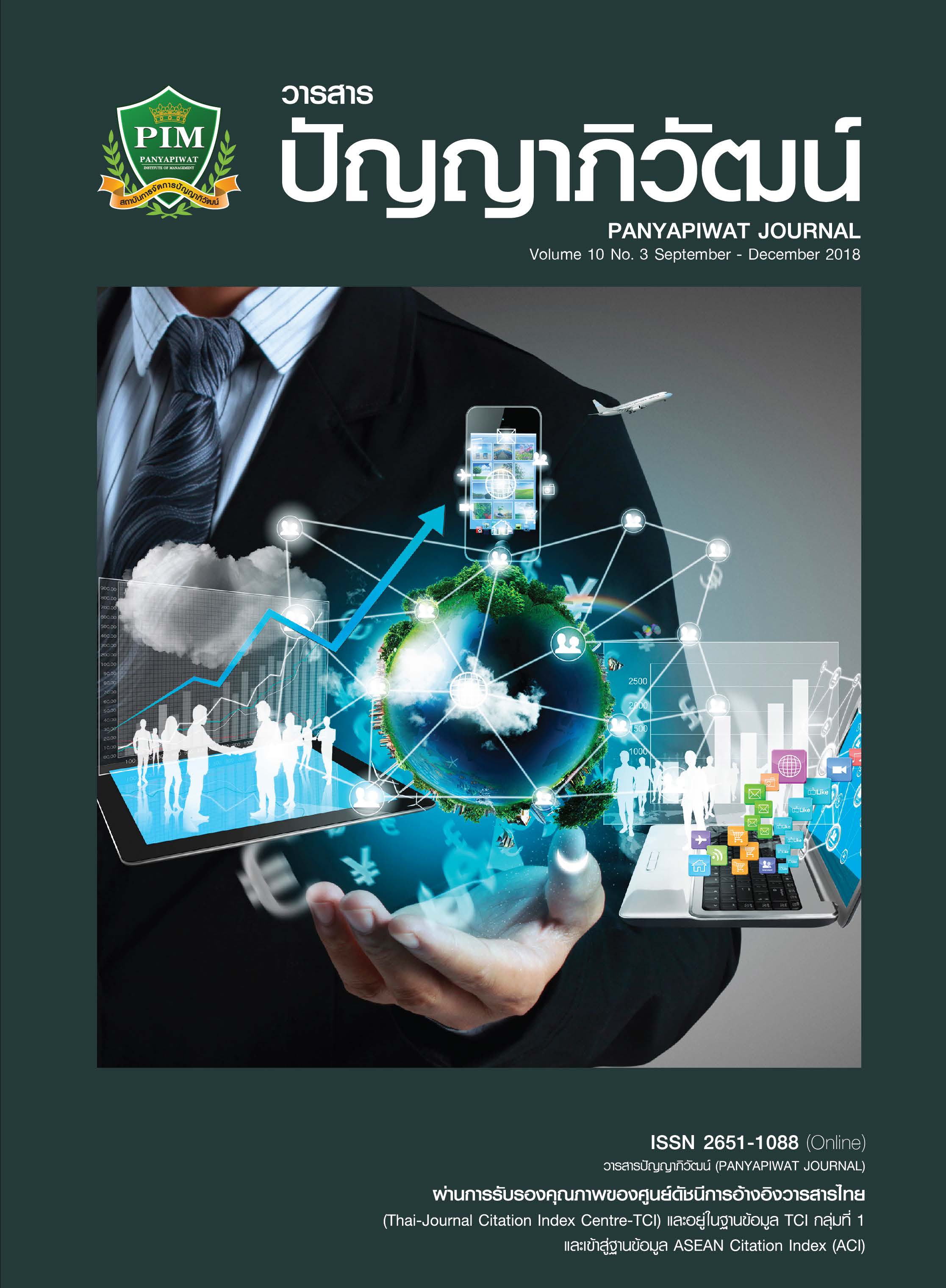การวัดความพร้อมของพนักงานที่มีผลต่อการเปลี่ยนแปลงกรณีศึกษา บริษัท กขค ในประเทศพม่า
Main Article Content
บทคัดย่อ
งานวิจัยนี้มุ่งศึกษาระดับความพร้อมต่อการเปลี่ยนแปลงขององค์กรภาครัฐในประเทศพม่าที่กำลังปรับเปลี่ยนแนวทางการบริหารมาสู่ระบบเอกชน โดยมุ่งหาสาเหตุการเปลี่ยนแปลงขององค์กรโดยใช้วิจัยเชิงปริมาณด้วยแบบสอบถามในการสำรวจข้อมูล จากผลการศึกษาพบว่า ตัวแปรการประเมินตนเองและข้อมูลส่วนตัวของกลุ่มตัวอย่างมีความสำคัญทางสถิติอย่างมีนัยสำคัญต่อความพร้อมในการยอมรับความเปลี่ยนแปลง นอกจากนี้ตัวแปรด้านสภาพแวดล้อมและทัศนคติของบุคลากรก็มีความสัมพันธ์ต่อการยอมรับความเปลี่ยนแปลงของบุคลากรด้วยเช่นกัน ผลที่ได้จากการศึกษาปัจจัยดังกล่าวนี้จะช่วยให้องค์กรภาครัฐที่กำลังออกนอกระบบเข้าใจและให้ความสำคัญต่อปัจจัยที่ส่งผลต่อการเปลี่ยนแปลง เพื่อหามาตรการลดการสูญเสียบุคลากรที่มีคุณภาพจากองค์กรในอีกทางหนึ่งด้วย
Article Details
“ข้าพเจ้าและผู้เขียนร่วม (ถ้ามี) ขอรับรองว่า บทความที่เสนอมานี้ยังไม่เคยได้รับการตีพิมพ์และไม่ได้อยู่ระหว่างกระบวนการพิจารณาลงตีพิมพ์ในวารสารหรือแหล่งเผยแพร่อื่นใด ข้าพเจ้าและผู้เขียนร่วมยอมรับหลักเกณฑ์การพิจารณาต้นฉบับ ทั้งยินยอมให้กองบรรณาธิการมีสิทธิ์พิจารณาและตรวจแก้ต้นฉบับได้ตามที่เห็นสมควร พร้อมนี้ขอมอบลิขสิทธิ์บทความที่ได้รับการตีพิมพ์ให้แก่สถาบันการจัดการปัญญาภิวัฒน์หากมีการฟ้องร้องเรื่องการละเมิดลิขสิทธิ์เกี่ยวกับภาพ กราฟ ข้อความส่วนใดส่วนหนึ่งและ/หรือข้อคิดเห็นที่ปรากฏในบทความข้าพเจ้าและผู้เขียนร่วมยินยอมรับผิดชอบแต่เพียงฝ่ายเดียว”
เอกสารอ้างอิง
Abrahamson, E. (2000). Change without pain. Harvard Business Review, 78(4), 9-79.
Armenakis, A., Harris, S. & Mossholder, K. (1993). Creating readiness for organizational change. Human Relations, 46(6), 681-703.
Armenkis, A. & Harris, S. (2002). Crafting a Change Message to create transformational readiness. Journal of Organizational Change Management, 15(2), 169-183.
Baron, R. M. & Kenny, D. A. (1986). The Moderator-Mediator Variable Distinction in Social Psychological Research: Conceptual, strategic, and Statistical Considerations. Journal of Personality and Social Psychology, 51(6), 1173-1182.
Burnes, B. (2009). Managing Change: A Strategic Approach to Organizational Dynamics (5th ed.). England: Pearson Education.
Burke, W. W. (2002). Organization change: Theory and practice. Thousand Oaks, CA: Sage Publications.
Chonko, L. (2004). Organizational readiness for change, individual fear of change, and sales managers’ performance: an empirical investigation. Journal of personal selling and sales management, 24(1), 7-17.
Cunningham, C., Woodward, C., Shannon, H., MacIntosh, J., Lendrum, B. & Rosenbloom, D. (2002). Readiness for organizational change: a longitudinal study of workplace, psychological and behavioural correlates. Journal of Occupational and Organizational Psychology, 75(4), 377-392.
Drucker, P. F. (1999). Management Challenges for the 21st Century (1st ed.). New York: HarperCollins Publishers.
Eby, L., Adams, D., Russell, J. & Gaby, S. (2000). Perceptions of organizational readiness for change: factors related to employees’ reactions to the implementation of team-based selling. Human Relations, 53(3), 419-442.
Gleick, J. (1987). Chaos: Making a New Science. London: Sphere Book.
Herold, D. M., Fedor, D. B., Caldwell, S. & Liu, Y. (2008). The effects of transformational and change leadership on employees’ commitment to change: A multilevel study. Journal of Applied Science, 93, 346-357.
Holbeche, L. (2006). Understanding Change Theory, Implementation and Success (1st ed.). Oxford: Roffey Park Management Institute.
Holt, D. T., Armenakis, A. A., Feild, H. S. & Harris, S. G. (2007). Readiness for Organizational Change: The Systematic Development of a Scale. The Journal of Applied Behavioral Science, 43(2), 232-255.
Martin, A., Jones, E. & Callan, V. (2006). Status differences in employee adjustment during organizational change. Journal of Managerial Psychology, 21(1/2), 145.
McKinsey & Company. (2008). Organizing for successful change management: a McKinsey global survey. McKinsey Quarterly, July.
Oreg, S., Vakola, M. & Armenakis, A. (2011). Change recipients’ reactions to organizational change: a sixty-year review of quantitative studies. Journal of Applied Behavioral Science, 47(4), 461-524.
Shah, N. & Shah, S. G. (2010). Relationships between employee readiness for organisational change, supervisor and peer relations and demography. Journal of Enterprise Information Management, 23, 640-652.
Smith, I. (2005). Achieving readiness for organizational change. Library Management, 26(6/7), 408.
Vakola, M. (2014). What’s in there for me? Individual readiness to change and the perceived impact of organizational change. Leadership & Organization Development Journal, 35, 195-209.
Vakola, M., Oreg, S. & Armenakis, A. (2013). Reactions to organizational change from an individualdifferences perspective: a review of empirical research. Cambridge: Cambridge University Press.
Wanberg, C. R. & Banas, J. T. (2000). Predictors and Outcomes of Openness to Changes in a Reorganizing Workplace. Journal of Applied Psychology, 85(1), 132-142.
Win, P. (2015). An overview of Higher Education in Myanmar. University Services Csnter (UNISERVE).


